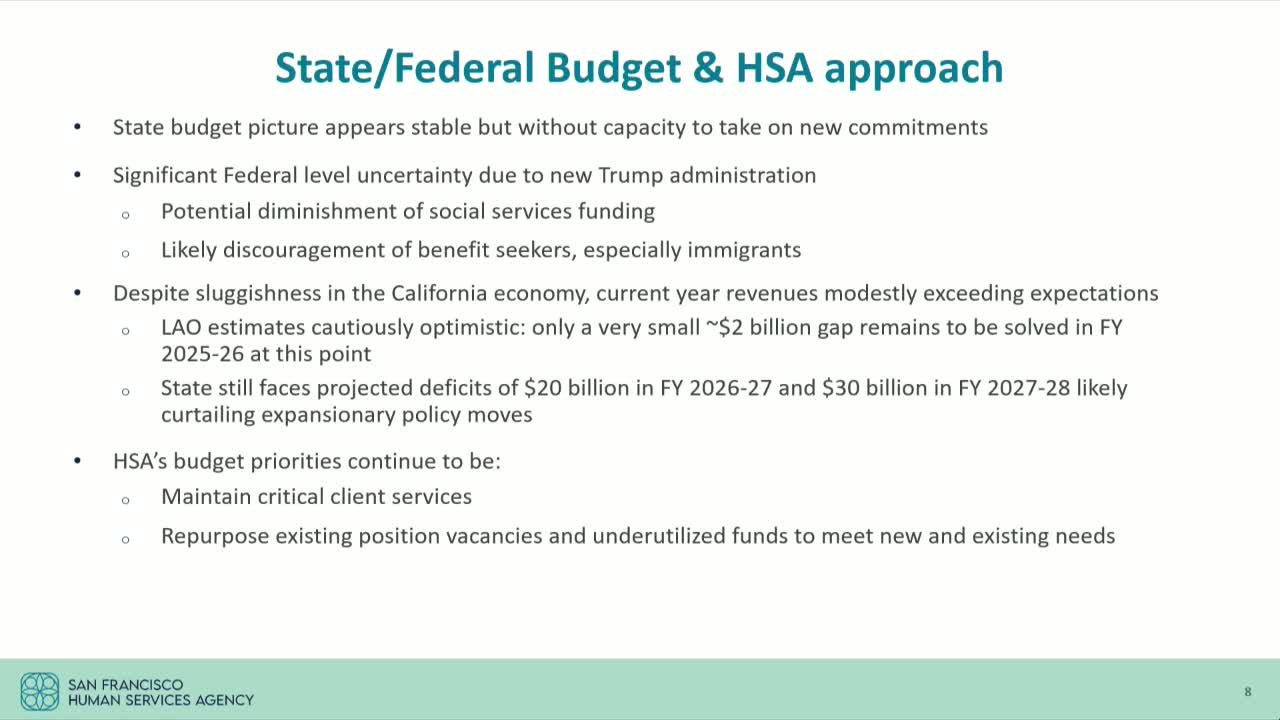Dignity Fund cycle‑end evaluation: DAS reports nearly 40% growth in funded services, but nutrition waitlists and sustainability remain concerns
Get AI-powered insights, summaries, and transcripts
Subscribe
Summary
The Human Services Agency presented the Dignity Fund Cycle and Evaluation (FY19‑20 through FY22‑23). The report finds the budget for dignity‑fund‑eligible services grew from about $68.9M to $95.2M, DAS launched or expanded many programs, and staff warn that expanded food services may be hard to sustain as one‑time pandemic funding phases out.
A Department of Disability and Aging Services presentation on Jan. 8 summarized the cycle‑end evaluation for the Dignity Fund covering the FY2019–20 through FY2022–23 funding cycle and concluded the fund substantially expanded services but faces sustainability challenges in some areas.
Aditi Villar, an HSA planning analyst, told the commission that Dignity Fund‑eligible budgets grew from about $68,900,000 in the baseline year to roughly $95,200,000 by the end of the cycle — a near‑40% increase — and that the department was able to add services and clients during a period that included the COVID emergency. "Over the 19‑20 to 22‑23 funding cycle, DAS substantially strengthened and expanded dignity fund eligible services in alignment with the plans that we laid out," Villar said.
The evaluation highlighted program‑level results: DAS increased funding for access and empowerment services (intake and ADRCs) by roughly $5.4 million, boosted community connection and engagement services (including neighborhood pilots and SF Connected tech) by about $5.4 million, and added nearly $9.0 million to nutrition and wellness programs, largely driven by temporary state and federal pandemic resources.
The report cited measurable increases: the department added nearly 5,400 enrollments over the cycle and more than 12,100 unique clients compared with the pre‑cycle baseline. At the peak of pandemic response activity (FY21–22) DAS supported roughly 1.4 million congregate‑meal distributions — a 34% increase over pre‑pandemic levels — and expanded home‑delivered meals funding by more than $3.7 million. Villar noted, however, that home‑delivered meals continue to have a waitlist that “exceeds 300 clients” and warned that sustaining expanded nutrition services will require ongoing funding as short‑term COVID resources expire.
Villar described program adaptations during COVID — to‑go and pickup congregate meals, remote and hybrid social programs, and investments in language access across ADRC sites — and said some vendor procurements (notably an earlier online resource directory contract) had to be terminated and reprocured to meet disability accessibility and usability requirements.
Executive Director Kelly Dearman called the report "an amazing report" and said the cycle demonstrates the Dignity Fund’s role in expanding culturally tailored services, outreach and new programs such as LGBT+ supports and neighborhood pilots. Commissioners from the Dignity Fund Oversight Committee praised the report and asked about data completeness. Villar acknowledged that a few programs do not enter client‑level data into the department’s DOS GetCare system, which limits unduplication for those services; she said those program enrollments are still counted in the enrollment totals and that program owners would need to decide whether to migrate those services into the case‑management system.
The department said it will use the cycle evaluation findings to inform the next four‑year cycle and to target outreach for underserved communities. The full cycle and evaluation report is posted on the department website for public review.
